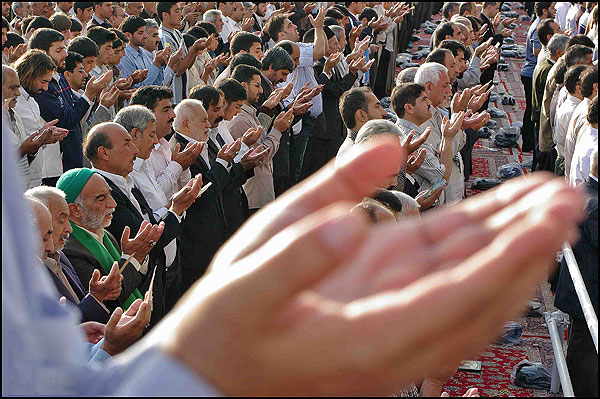 When the Islamic scholars in the field of morality talk about the way to perfection or as the answer to the question that some Muslims who are seeking the moral perfection ask, the scholars reply by recommending two very important advices that are taken from the teachings of Islam, these tow precious and very beneficial advices are called Moraghabah and Mohasabah.
When the Islamic scholars in the field of morality talk about the way to perfection or as the answer to the question that some Muslims who are seeking the moral perfection ask, the scholars reply by recommending two very important advices that are taken from the teachings of Islam, these tow precious and very beneficial advices are called Moraghabah and Mohasabah.
Let’s define them at the beginning.
Moraghabah means self-observance, and to be the observant of our deeds and thoughts, to control ourselves not to disobey Allah.
The second word is Mohasabah which means calculation and in our subject means to look deeply to our deeds once a while and see did we commit any wrong or did we do anything right?
The effects and benefits of these two acts are obvious, because if someone wants to reach to moral perfection, he/she cannot let him/herself to be free from any limitation and just by the wish of perfection or even by talking about that and about the lives of the very pure mystic Muslims, expects to be in the level in which the real mystics are.
Let’s see the root of these two effective advices in our religion.
The holy Quran says in chapter Infitar verses 10-11-12:
وَإِنَّ عَلَيْكُمْ لَحَافِظِينَ
كِرَامًا كَاتِبِينَ
يَعْلَمُونَ مَا تَفْعَلُونَ
“Yet over you there are watchers.
Noble scribes,
Who know of all that you do.”
In another verse, verse 18 of chapter Qaf, Allah said:
مَا يَلْفِظُ مِن قَوْلٍ إِلَّا لَدَيْهِ رَقِيبٌ عَتِيدٌ
“Whatever phrase he (human) utters, an observer is present.”
Or in verse 1 from chapter Nisa, Allah said:
إِنَّ اللّهَ كَانَ عَلَيْكُمْ رَقِيبًا
“Allah is ever watching over you”.
Or in verse 14 from chapter Alaq we read:
أَلَمْ يَعْلَمْ بِأَنَّ اللَّهَ يَرَى
“Does he not know that Allah sees?”
And there are a lot of other verses and Narrations that talk about the dominant knowledge of Allah over everything that we do not mention them here.
So till now we understood that we are under the dominant look of Allah, so if we really reach to a level of morality that we feel ourselves in His presence, we do not commit any sin.
The second part of our subject was Mohasabah or calculation of our deeds by ourselves.
There is a Narration from Imam kazim peace be upon him who said:
“The one, who does not calculate his/herself every day, is not among us (among our real followers).” then the Imam describes the way of that by saying:
“If he/she has done a righteous act, he/she asks Allah to give him/her chance to do it more and if he/she has done a sin, asks Allah to forgive him/her.”
There are so benefits in this stage, for example we get aware of our faults and righteous deeds, and we can compensate the wrong deeds and enhance the good deeds. The scholars liken this important calculation of self to a businessman who once a while calculates his business and observes the interests and the shortages and detriments of his business, if he owes to others and has to pay something back, it makes him reminded to try to pay it or he can get aware from the dangers that threaten him and his business or the ways that he can get more legal interests etc.
You know many times we are negligent of our deeds and we might consider ourselves perfect, but at the time of precise calculation especially at the time that this calculation is done soon by soon like at the time of sleeping every night, we get aware of our faults and sins.
There are many verses of the holy Quran and the Narrations which mention that there will be calculation on our deeds on the Day of Judgment, like:
The holy Quran says in chapter Zelzal verses 7-8:
فَمَن يَعْمَلْ مِثْقَالَ ذَرَّةٍ خَيْرًا يَرَهُ
وَمَن يَعْمَلْ مِثْقَالَ ذَرَّةٍ شَرًّا يَرَهُ
“Whosoever has done an atom’s weight of good, shall see it.
And whosoever has done an atom’s weight of evil, shall see it”.
In another verse, verse 284, chapter Bagharah, Allah said:
إِن تُبْدُواْ مَا فِي أَنفُسِكُمْ أَوْ تُخْفُوهُ يُحَاسِبْكُم بِهِ اللّهُ
“Whether you reveal what is in your hearts or hide it, Allah will bring you to account for it”.
You know that one of the names of the Day of Judgment is the day of calculation.
The holy Prophet of Islam said:
“Calculate yourselves before the day that you will be calculated and weigh yourselves before the day that you will be weighed.”
We understand from this Narration, that through Mohasabah, we do somehow the same calculation that the angels of Allah will do on the Day of Judgment.
————————————
Source:
Akhlagh.porsemani.ir
 Everyone like to be more attractive and try many ways but a few of people find a correct path
Everyone like to be more attractive and try many ways but a few of people find a correct path




